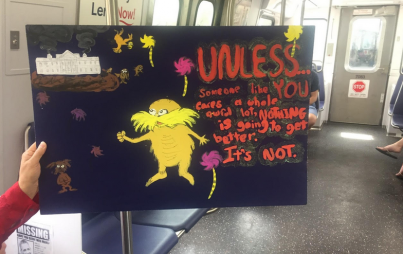![[W]hen Donald Trump talks about women to other men, he only considers the feelings of the men he’s talking to, not the feelings of the women he’s talking about. Image: Michael Vadon/Wikipedia. [W]hen Donald Trump talks about women to other men, he only considers the feelings of the men he’s talking to, not the feelings of the women he’s talking about. Image: Michael Vadon/Wikipedia.](/sites/default/files/images/article/2019-03/1280px-Donald_Trump_Signs_The_Pledge_04.jpg)
[W]hen Donald Trump talks about women to other men, he only considers the feelings of the men he’s talking to, not the feelings of the women he’s talking about. Image: Michael Vadon/Wikipedia.
How “The Donald” is like that unrelenting creep on a dating site, and what he’s offering men in America.
“Nobody has more respect for women than me,” Trump says for the umpteenth time in an interview, and for the umpteenth time, the interviewer doesn’t call him out.
What do you say to a man who speaks only in hyperbole? Of course there are people in the world who have more respect for women than Donald Trump. Let’s start with the 3.5 billion people who are women. Is Trump saying that he has more respect for women than women have for themselves?
This is what’s frustrating about being a serious voter observing the Trump campaign: no matter how nonsensical his words are, we always feel the need to piece together the logic in them.
So, Mr. Trump, if you truly believe you’ll be “phenomenal to the women,” then when do you plan to start?
Last August, Mr. Trump promised us, “I will be phenomenal to the women,” but in the eight months that followed, he has only offered specifics on how his policies will hurt “the women,” from his potential Supreme Court picks to his threat of a punishment for women who have abortions. Then, of course, there are the allegations of assaults against women at his rallies, the disparaging of Carly Fiorina and Heidi Cruz’s looks, and the Twitter war with Megyn Kelly.
So, Mr. Trump, if you truly believe you’ll be “phenomenal to the women,” then when do you plan to start?
To understand how Trump truly views women, one need only Google the 1988 Oprah interview, wherein he says, with his first wife Ivana sitting next to him on the couch, “There’s not a lot of disagreement [in our marriage] because, ultimately, Ivana does exactly as I tell her to do.” Ivana laughs and retorts, “Male chauvinist!”
It reads as a joke (albeit a very dated one, since a joke like this would never fly on a daytime talk show) and is meant to entertain the men in the audience rather than to demean his wife or other women. But that’s precisely the problem: when Donald Trump talks about women to other men, he only considers the feelings of the men he’s talking to, not the feelings of the women he’s talking about. If he thinks disparaging a woman’s looks will make another man laugh, he seizes that opportunity, and then, when another man confronts him about it, he always walks back his words.
Oprah didn’t call Mr. Trump out on his chauvinistic words in 1988, but 27 years later, Megyn Kelly did. She read off a list of misogynistic quotes Mr. Trump had said over the years, most of them on his reality TV show, and noted that these would all be attacks the Clinton campaign would throw at him. She did not call him sexist or personally attack him, but she noted that his history of sexism would be a liability to his campaign and asked him to defend himself.
It was all very reminiscent of the unrelenting creep on a dating site. He starts by acting entitled …
Ironically, he didn’t answer the question, and instead of addressing Ms. Kelly’s concerns about misogyny, Mr. Trump doubled down on his misogyny with sexist attacks against Ms. Kelly. “I’ve been very nice to you,” he whined, indignantly, “Although I could probably maybe not be, based on the way you’ve treated me, but I wouldn’t do that.”
It was all very reminiscent of the unrelenting creep on a dating site. He starts by acting entitled: the fact that he is “nice to you” means you owe him special treatment, even though his overall character is anything but nice. Then, when you don’t give him what he wants, he threatens you and calls you names, and he doesn’t stop until you block his account.
Unfortunately for Ms. Kelly, Ms. Fiorina, and Mrs. Cruz, the creep they’ve crossed paths with isn’t going anywhere, because millions of men with those same misogynistic views have propped him up, leveling their own attacks on these women’s physical appearances and career ambitions.
Mr. Trump’s message to all of these women is clear: be attractive and don’t talk back.
Does Hillary Clinton care what Mr. Trump thinks of her physical appearance? Of course not. Her political opponents have spent the past 25 years mocking her looks. She’s used to it, and so are the undecided voters Mr. Trump needs to win over. Yet most of us fully expect, based on his previous treatment of women, that Mr. Trump will spend the general election attacking Hillary Clinton’s looks, her marriage, her clothes, and her demeanor, all to distract from the fact that he isn’t prepared to be commander in chief.
… Mr. Trump didn’t make these men misogynists, but he certainly gave them a venue to spew their hate.
In a recent New York Times column, conservative pundit David Brooks interprets Trump’s campaign strategy as follows: “He [Trump] takes economic anxiety and turns it into sexual hostility. He effectively tells men: You may be struggling, but at least you’re better than women[…]”.
Based on what male Trump supporters write daily on Megyn Kelly’s Twitter page, it appears Mr. Brooks has a point. Unattractive and unsuccessful men feel comfortable calling Ms. Kelly a “bimbo” and a “lightweight,” because Mr. Trump has assured them it’s OK. What reason would any of these men have to feel superior to a respected journalist on the leading cable news network in the country? Misogyny is the only thing that could justify their feelings of superiority, and Mr. Trump didn’t make these men misogynists, but he certainly gave them a venue to spew their hate.
Trump is often criticized for his lack of understanding about foreign policy. He is called an “isolationist” because he believes in protecting American interests at the expense of other countries, not realizing that in a global economy, sometimes the interests of other countries are American interests. With women, frighteningly enough, he is just the same. He believes in protecting the interests of men at the expense of women, but policies that hurt women will ultimately hurt men, too.
This post originally appeared at the Good Men Project. Reprinted with permission.
Read more from GMP:







